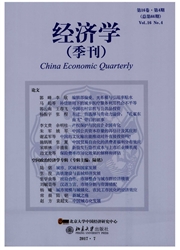

 中文摘要:
中文摘要:
文章运用世行《中国投资环境调查》(2005年)中对2004年我国12400家企业的调查数据,实证分析了我国制造业企业信贷融资约束对员工收入的影响。研究结果表明,我国企业所存在的信贷融资约束总体而言会显著地降低员工收入水平,即使是在未获得贷款企业内部,该负向作用仍然显著存在。稳健性检验表明,融资约束对员工收入的负影响这一结论并不随融资约束度量指标、估计模型设定以及融资约束的内生性问题而发生改变。进一步研究表明,短期内企业信贷融资约束对员工收入的显著负向作用由前者对企业劳动生产率的显著抑制作用直接导致,并且该负向作用在非正规雇佣比重高的企业中更为明显,因为非正规雇佣比重高的企业所存在的信贷融资约束还会显著降低企业的劳动力需求,从而使员工收入进一步减少。本文的研究成果为从完善金融体系、提高金融发展水平方面改善劳动力收入提供了经验支持。
 英文摘要:
英文摘要:
This paper examines the causal effect o{ firms' credit constraints on employees' income, based on a sample of 12 400 Chinese manufacturing firms collected by the World Bank's Enterprise Survey. The main estimation results show that firms with higher de- gree of credit constraint tend to offer lower wages. Even within those not obtaining bank loans, such negative effect remains significant. The robustness tests show that the negative effect of credit constraints on income still holds true even if we consider different measure of credit constraints, the specification of estimation models, as well as the endogeneity problem of credit constraints. Further analysis indicates that. the negative effect directly originates from the impact of credit constrains on labor productivity, and it is more significant for firms with higher proportion of informal employment. Because these firms would significantly re- duce their demand for labor if they were credit constrained, and this would cause a further diminution in vcages. The main findings indicate that financial reform helps to improve tabor income in China by alleviating firms' financial constraint.
 同期刊论文项目
同期刊论文项目
 同项目期刊论文
同项目期刊论文
 期刊信息
期刊信息
